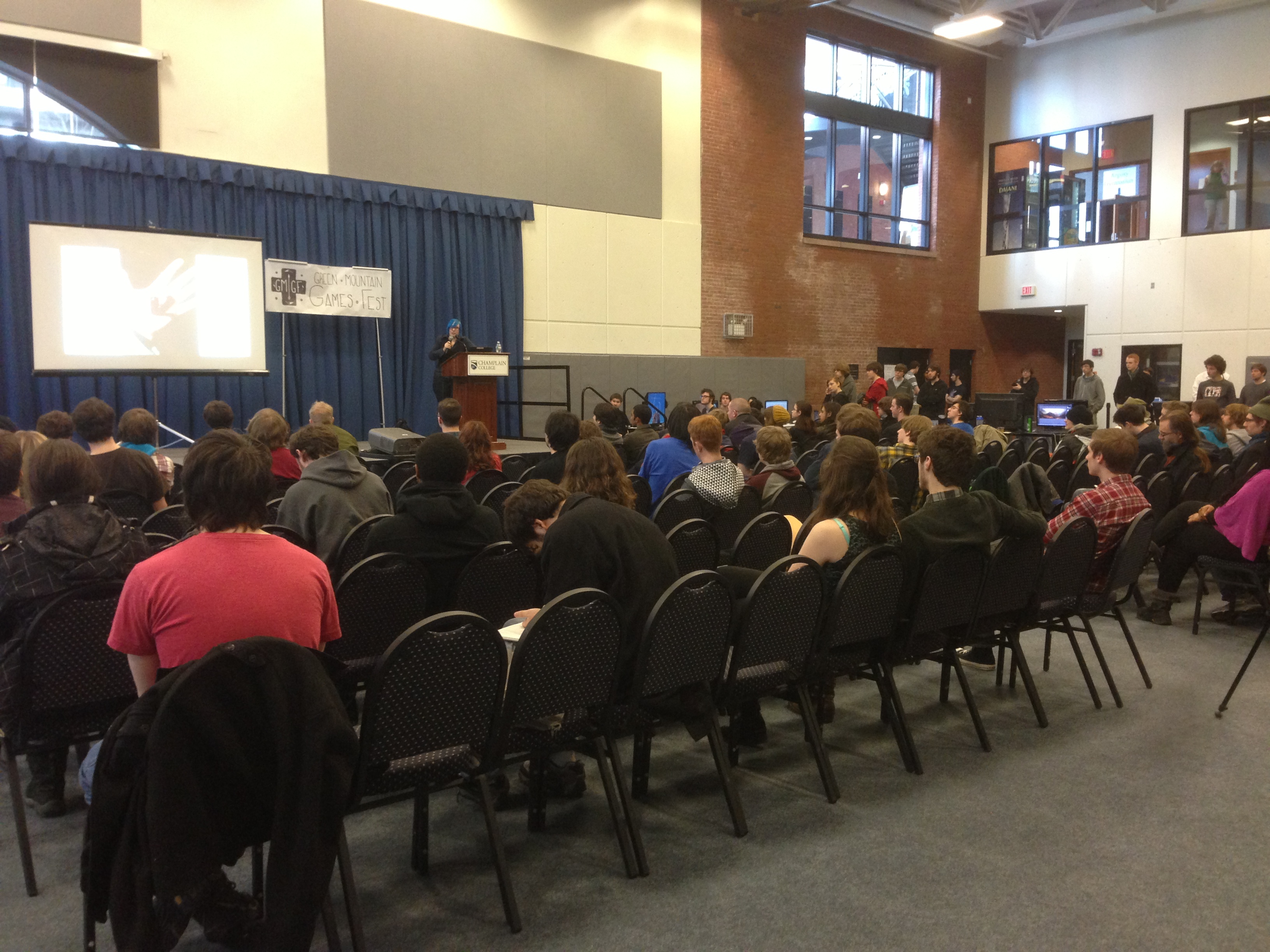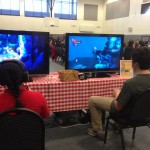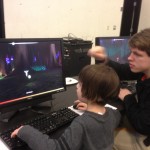“How do you make a video game about depression?”
I had just walked into the first-ever Green Mountain Games Festival in the Champlain College Argosy Gym on Saturday, February 22, when I heard this question. It came from Zoe Quinn, a blue-haired woman standing on the stage in the center of the room. Quinn was one of the festival’s four speakers — the Boston-based game designer, coder, writer and artist is the creator of “Depression Quest,” an award-winning narrative game, playable online, that simulates the experience of living with depression.
I had come to the festival with my 5-year-old daughter, Ivy, hoping to play some of the games created by Champlain College video gaming students; dozens of desktops, laptops and tables ringed the speaker area, inviting players to try all kinds of student creations. But I found myself captivated by Quinn’s address. While Ivy test-drove the games, I tuned in to Quinn’s account of making Depression Quest — at least 50 others sat in front of the stage as she spoke; another 50 or so standing behind the tables around the room listened attentively. It was the perfect illustration of the fact that game design is about more than just making a more-realistic first-person shooter.
Quinn spoke of her own struggle with depression, which spurred the creation of her game. She hoped to make something that would let other depression sufferers know that they aren’t alone, and she wanted to show people who aren’t depressed what it’s like to live with this often debilitating condition.
The result is essentially a Choose-Your-Own-Adventure-type of interactive narrative experience. Players confront different scenarios and make choices about how to react. The moody soundtrack and static-filled visuals change based on the actions taken.
Quinn explained that her team designed the game so that players could choose to do therapy or take medication, but those weren’t requirements. Medication, she pointed out, “takes the edge off.” But, she said, “We also made it so that it could have side effects.”
Players can also take other actions, such as adopting a cat, because having an animal around can help. “If something really crappy happens, you’re not alone at the end of the day,” she said.
She admitted that the team considered how playing the game could make someone even more depressed. “We’re doing what we can to minimize the damage,” she said. They limited playing time to one hour, for example. And the game site links to iFred, the Foundation for Research and Education on Depression, which also receives a portion of the revenue generated by the game’s invitation to players to “pay what you want.”
Quinn explained that the team decided to avoid dealing with the tricky issue of suicide: Not only would it have been painful to design that part of the game, but “I didn’t want people playing the game to try to kill themselves.”
She also pointed out this isn’t a game you can win. Players can’t be cured; that’s not even possible. Because, she said, depression “is something you manage. Something you live with.”
She ended her presentation with a reminder that “you are not alone.” The audience gave her a standing ovation.
But few of the games on display at the festival were so heady or heavy. While Quinn spoke, Ivy quietly played three different games. I never figured out the name of the first one she tried, but she played it for at least 20 minutes. She used the arrow keys on a PC keyboard to jump a gray monster through obstacles that could smash him into tiny pieces. It wasn’t clear where exactly he was headed, but she enjoyed making him hop from platform to platform.
The next one she attempted was a tablet game called SunBots. The game was a senior project for a group of Champlain gaming students, two of whom — Matt Surdej and Liznel Pina — stood behind the table and explained to Ivy how to play. I gathered that Ivy was controlling a rocket ship/robot that was circling celestial bodies and jumping between them. I had to pull her away from it to visit another station.
Our final stop was at the table run by a student group calling itself Blue Moose Entertainment. There, senior Phillip Wellheuser patiently explained to Ivy how to play his group’s multiplayer game Wisp. Her showed her how to use a PC keyboard to control a fairy who travels through a lush landscape collecting little fairy lights. As he was showing Ivy how to make her fairy move, Wellheuser confided to me that the game was really designed for kids 8 and up, which was probably why Ivy was having some trouble figuring it out. I bet she would have mastered it if we’d had a few more minutes to play, though.
We had to leave after an hour or so — Quinn’s presentation was just ending as we finished with Wisp.
I would have liked to have stayed and checked out the rest of the 31 exhibitor booths. There were a few professional studios there alongside the students, including Boston-based Skymap, which brought a guy dressed in a bacon costume to promote Bacon Man: An Adventure.
On our way out, we stopped by the registration table to talk with organizer Jake Jackson, ’14, of Team Aurora Games. He said he’d seen about 250 people come through so far — not a bad turnout for a first-time, student-run event. In an email he sent me beforehand, he said that he and the other student organizers “hope that it will be successful enough to become an annual event that people can look forward to each year.”
I hope so, too.
On the way home, Ivy asked if we could download any of the games she played. Not yet, I told her — they’re all student projects that are still under construction. But maybe someday…






